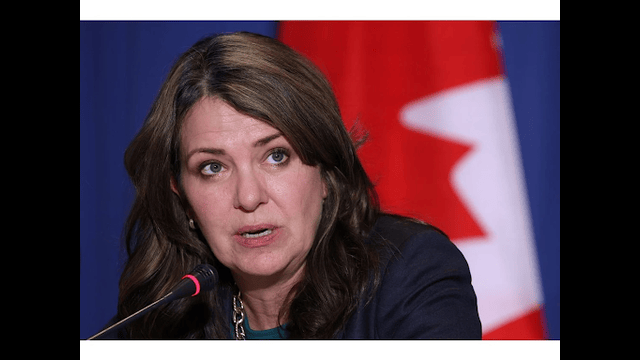
Danielle Smith, the current premier of Alberta. Financial Post
Alberta Premier Danielle Smith has made it clear that she will not accept the current state of Alberta's relationship with the federal government under Mark Carney’s leadership. Smith challenged Carney to negotiate a better deal for her oil-rich province after the Liberal prime minister's re-election.
While congratulating Carney on his victory, Smith expressed the frustration of many Albertans. She said that many are upset because the Liberal government, which has been critical of Alberta’s oil economy, is still in power. Smith added that she wants Carney to work with the Alberta government to reset the relationship between Ottawa and Alberta with meaningful actions, not just empty promises.
“Albertans are proud Canadians who want our nation to be strong and united, but we will no longer tolerate our industries being threatened and our resources being blocked by Ottawa,” Smith said. She emphasized Alberta’s desire for a better future where the federal government respects provincial jurisdiction and the province's oil and gas development.
This growing tension has been ongoing since 2015, when Justin Trudeau, Carney's predecessor, introduced policies aimed at reducing Canada’s carbon footprint. These policies included an emissions cap, stricter pipeline regulations, and a ban on tankers along the northern British Columbia coast. Smith has stated that these measures hinder the development of Alberta's oil and gas industry, which relies heavily on pipelines and international exports.
As frustration mounts, some Albertans have called for more autonomy from the federal government. This feeling has even fueled a small but persistent movement advocating for Alberta's secession from Canada. In response to these challenges, Smith announced that the Alberta government would hold a caucus meeting to discuss the province’s future within a united Canada.
In his victory speech, Mark Carney acknowledged the need for unity across Canada. He promised to govern for all Canadians and pledged to help the country become a “superpower” in both clean and traditional energy. Carney’s plans include increasing oil production while working to reduce emissions. Despite his intentions, experts worry that Carney’s stance on environmental assessments, such as Bill C-69, could make it difficult for new oil pipelines to be approved.
Eric Nuttall, a senior portfolio manager, shared his thoughts on the situation. He believes that Carney’s reluctance to repeal Bill C-69 would lead to a “status quo” for Canada’s oil sector, meaning the industry will struggle to expand without the ability to build new pipelines. As a result, the oil sector might focus on returning profits to shareholders instead of expanding production.
Lisa Baiton, the CEO of the Canadian Association of Petroleum Producers, expressed hope that the election had raised the importance of oil and gas to Canada’s economy. She pointed out that Canada is at a critical moment, dealing with challenges both at home and internationally. Baiton emphasized that fully developing Canada’s oil and natural gas resources would boost energy security and economic stability.
As Alberta continues to push for a better deal with the federal government, the future of the province’s relationship with Ottawa remains uncertain.















